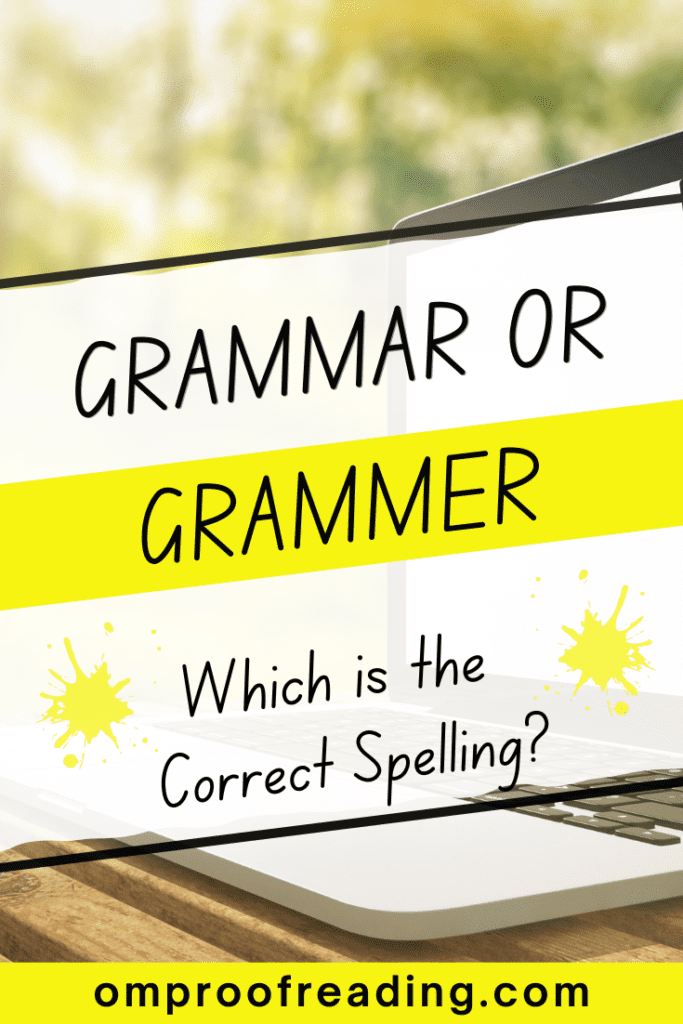This article may contain affiliate links. Please see our affiliate disclaimer in the footer menu for more information. Thank you for your support!
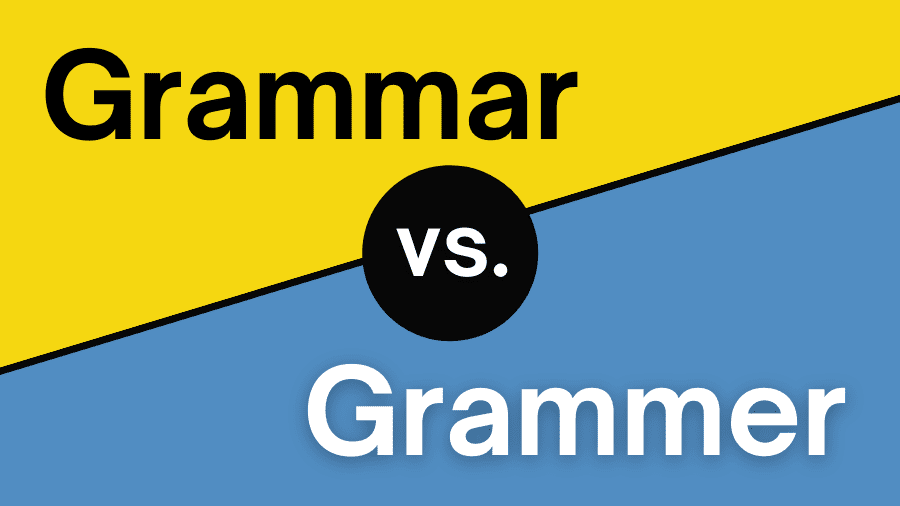
If you’re not a stellar speller, you may wonder if grammar or grammer is the correct spelling of the word we’ve all heard in English class.
The correct spelling is g-r-a-m-m-a-r. Grammar (ending in –ar) is the set of rules dictating how we put words together to form sentences. Some people mistakenly write grammar with –er instead of –ar because of how the word sounds.
Let’s look at the origin and definition of the word grammar (a common noun) and see how to use it correctly in some example sentences. We’ll also learn about Grammer, which is a proper noun. Finally, we’ll understand why the word grammar is often misspelled.
But first, let’s see the main differences between the terms grammar and Grammer.
Grammar vs. Grammar: What’s the Difference?
| grammar | Grammer | |
|---|---|---|
| What Is It? | how we combine words to make sentences (grammer is a misspelling of grammar) | a last name; also a place in Indiana |
| Is It Capitalized? | only if it’s the first word in a sentence | yes, always |
| Part of Speech | noun (common) | noun (proper) |
| Same Spelling in US and UK English? | yes | yes |
Grammar or Grammer: Which Is the Right Spelling?
The proper spelling is g-r-a-m-m-a-r with an -ar ending.
The term grammer with an –er ending is not in the dictionary—it’s a misspelling of grammar.
The -ar ending is the correct spelling in US English, but what about in UK English?
As you probably know, British spelling sometimes differs from American spelling.
Lucky for us, grammar is spelled the same way across all dialects of English: US, UK, Canadian, and Australian.
So now we know the correct spelling, but how will we remember it?
We don’t want to have to check the dictionary every time we need to write this term.
How to Remember the Correct Spelling
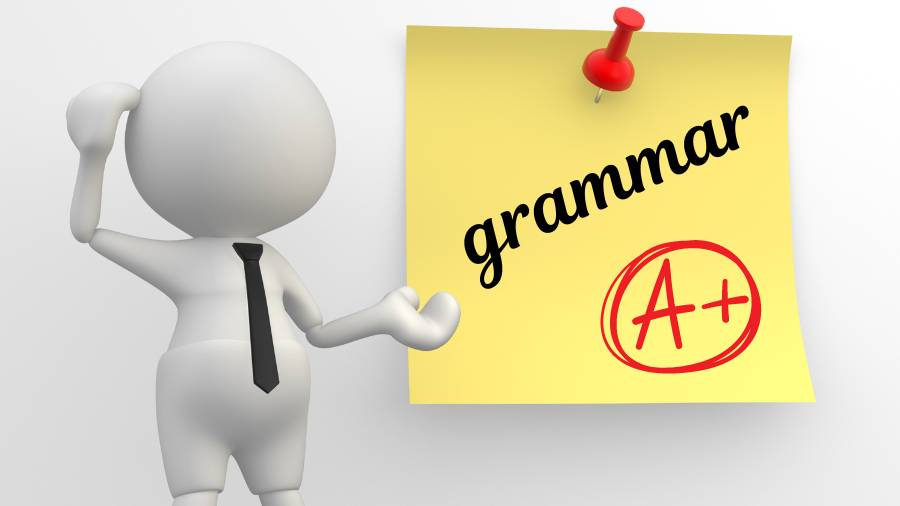
How are we going to make the right spelling stick in our brains?
This is how I remember it: I tell myself that if I spell grammar with an a in the last syllable, the teacher will give me an A in grammar class.
Just think about getting an A in grammar, and you’re good to go. Super simple!
Now let’s see how this hard-to-spell word came to be.
What Is the Etymology of the Word Grammar?
Etymology deals with the history and origin of words.
So what’s the origin of the word grammar?
“The word grammar comes into English from French and Latin, and ultimately from the Greek grammatikós. The Greek grammatikós means “knowing one’s letters” and is based on the word gramma (“letter”).”
– Source: Dictionary.com
Let’s move on to the definition of grammar.
What Is Grammar (with an -ar)?
Grammar deals with words and the ways we combine them to make sentences.
Here’s how The Chicago Manual of Style, a style guide used by professionals in the US book publishing industry, defines grammar:
“In its usual sense, grammar is the set of rules governing how words are put together in sentences to communicate ideas—or the study of these rules.”
Source: The Chicago Manual of Style, 17th Edition
We’re clear about the meaning of grammar, so let’s find out how to use it correctly.
Examples of the Correct Use of Grammar
- In today’s grammar lesson, Nancy learned about the role of conjunctions.
- A résumé needs to have good grammar and punctuation to avoid rejection.
- His mother told him to use proper grammar when speaking.
- I enjoy writing blog posts about English grammar. 😊
What Is Grammer (with an -er)?
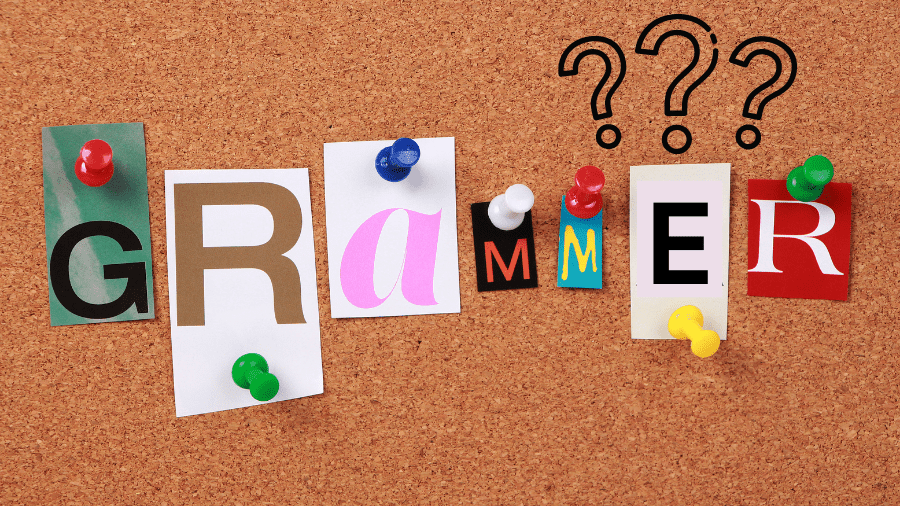
If you thought that grammar (the kind we just talked about) was spelled with –er, don’t worry. You’re in good company!
Non-native and native English speakers are prone to making this mistake due to how we pronounce the word.
Later, we’ll delve deeper into the reason behind this mistake.
So we know grammer is a misspelling of grammar.
But what does Grammer mean?
Grammer (with a capital G and –er ending) is a proper noun.
It’s a last name (aka surname) of German and Anglo-Saxon origins (source).
It’s also the name of an unincorporated community in the US state of Indiana.
Now let’s check out a few sentences with the word Grammer.
Examples of the Correct Use of Grammer
- Kelsey Grammer is best known for playing Dr. Frasier Crane on the popular TV series Frasier.
- Mabel Grammer was a journalist and civil rights activist from Hot Springs, Arkansas.
- Andy Grammer is a talented singer and songwriter who was born in Los Angeles.
- Do you know anyone who lives in Grammer, Indiana?
That wraps up our example sentences with Grammer.
Why Is Grammar Often Misspelled as Grammer?
People misspell the word grammar because we spell words based on how they sound.
It’s the end of the word grammar we misspell.
And what does the end sound like?
It sounds like the “rr” in the “grr” sound a growling dog makes.
We often spell this sound –er.
Here are just a few common words that end with the “rr” sound and are spelled with –er:
- mother
- father
- sister
- brother
- water
- power
- hammer
- computer
- teacher
- anger
Furthermore, we use the suffix –er to form comparative adjectives in English.
For example, hot becomes hotter, fast becomes faster, and large becomes larger. And we pronounce all these familiar words that end in –er with the same “rr” (as in “grr”) sound.
It’s hard to find a common word in English that rhymes with grammar and has an –ar ending. The word damar (yes, it sounds similar to “damn her”) rhymes with grammar and ends in -ar.
But what the heck is damar? Apparently, damar is a kind of natural resin used in inks and varnishes. Who knew? Not me. 😉
So spelling the word grammar with an –er at the end is an easy mistake to make. After all, it’s a logical approach.
Unfortunately, in English, we don’t always spell words phonetically (i.e., based on how they sound).
Consider the following words:
- doctor
- behavior
- glamour
All these words have the “rr” sound we discussed, but each is spelled differently at the end.
If you’re a native English speaker, just be glad you grew up learning these crazy spellings. And if you’re a non-native English speaker, I feel your pain.
Rest assured, even native English speakers struggle to spell certain words in our language. I promise!😊
Why Is Correct Spelling Important in Writing?
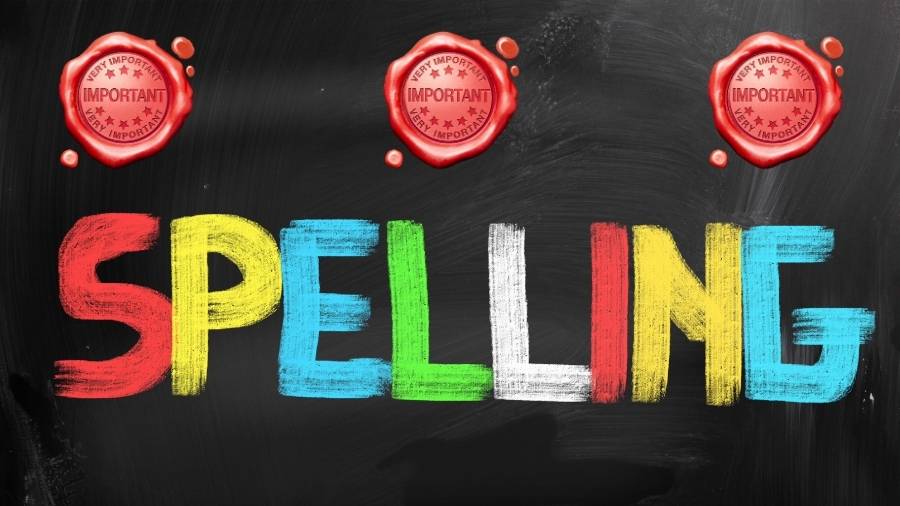
Correct spelling is important in writing for many reasons. Proper spelling conveys professionalism, shows we respect the reader’s time, enables us to communicate clearly, and enhances the readability of our message.
Taking the time to proofread our writing for misspellings shows we appreciate the reader’s attention.
We don’t want them stumbling over spelling missteps while trying to make sense of our message.
And they may stop reading if they continue tripping over typos.
If they know we didn’t check our spelling, perhaps we didn’t take the time to conduct sufficient research or ensure our writing is factually correct. Yikes!
Misspelled words are like little red flags. They tell our readers that we may not be a credible source.
Now let’s see a couple of common questions about grammar.
Frequently Asked Questions
Where can I check my grammar online?
Grammarly’s free grammar checker is one of the best sources to check your grammar. It also checks spelling and punctuation, but the checks for punctuation are quite limited, and the ones for spelling and grammar aren’t foolproof.
Nevertheless, this free checker can save you from making some grammar mistakes.
If you want a more robust grammar checker, Grammarly offers a paid version. I compare Grammarly’s free and paid versions if you’d like to learn more.
What are the two main types of grammar in the English language?
The two main types of grammar in the English language are prescriptive and descriptive.
Prescriptive grammar emphasizes how language should be used, according to traditional rules. We were taught this kind of grammar in school so we could understand how to speak and write properly. I like to think of prescriptive grammar as the grammar we were “prescribed” in the classroom.
Descriptive grammar examines how native speakers use language in everyday life. It doesn’t suggest how language should be used; it simply describes how it’s used. You hear this kind of grammar in daily life.
I hope this article helped demystify the spelling conundrum of grammar or grammer, and I hope you enjoyed reading it as much as I enjoyed writing it!
If you want to learn more about grammar, you may like this article from Om Proofreading: Grammar vs. Spelling: How Are They Different?
Best wishes to you!
“Failures are the stairs we climb to reach success.”
– Roy T. Bennett
